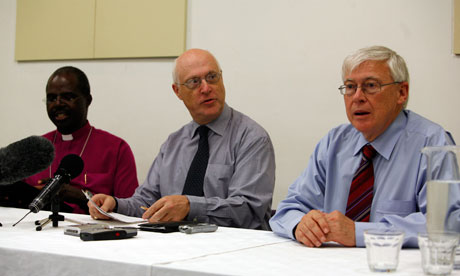As predicted, the "whining, sniffling, tantrums and objections" are just beginning in England as GAFCON moves to establish Anglican Reformational and Evangelical jurisdictions within England. This will be a double-header. This is the first inning (for baseball fans). For hockey fans (me), this is the first period and there are going to be some fights, gloves doffed, and fists flying...all in good Anglican style...harumph, harumph with dignity. This is just beginning. Get your popcorn and soda for a ringside seat. Something about the Church Militant gathering and feeding the elect while driving off and banishing wolves?
http://www.guardian.co.uk/commentisfree/belief/2011/jun/28/gafcon-homosexuality-anglican-mission
When is Gafcon going to start listening?

Leaders of Gafcon (Global Anglican Future Conference) and FCA (Fellowship of Confessing Anglicans) see themselves as championing traditional Anglicanism. Others regard them as out of step with church tradition, and object to their attempts to undermine others in the family of churches making up the Anglican Communion.
In May, a statement was issued by the council of primates (most senior bishops) of Gafcon/FCA, which lamented "the promotion of a shadow gospel that appears to replace a traditional reading of Holy Scriptures and a robust theology of the church with an uncertain faith and a never ending listening process". Yet for many, the "listening process" on sexuality never truly started.
A Communion-wide process of "deep and dispassionate study of the question of homosexuality" taking seriously "both the teaching of Scripture and the results of scientific and medical research", "pastoral concern for those who are homosexual" and "dialogue with them" began in 1978, when I was a closeted teenager.
The next Lambeth conference of bishops, in 1988, also highlighted the importance of "human rights for those of homosexual orientation". By then, I was working for the London-based Black Lesbian and Gay Centre, supporting numerous other lesbian, gay, bisexual and trans (LGB&T) people of Asian, African and Latin American descent living in or passing through London, and in touch with groups and networks overseas.
In some countries, anti-gay laws passed in colonial times remained on the statute book but were virtually unused. Elsewhere, however, homophobia intensified as, amid global imbalances in wealth and power, people frustrated at the lack of economic and social progress sought scapegoats. Corrupt and self-serving governments often encouraged the targeting of ethnic or sexual minorities. But those on the receiving end, and others concerned with human rights, organised to resist. By the time of the 1990 International Lesbian and Gay People of Colour conference, held in London, there were lesbian and gay groups and networks in various parts of the world, while others were emerging.
There was also a surge in scholarship about the variety of forms that same-sex love took in different cultures and periods. Meanwhile, internationally, many people felt destabilised by social change over which they had little control. There was a backlash in some churches against what seemed to be the erosion of old certainties, as beliefs were explored and scholars proposed fresh interpretations of the Bible.
The view that same-sex relationships were necessarily wrong was by then being questioned by increasing numbers of theologians, some of whom were conservative about core doctrines such as Christ's resurrection. However some "traditionalists" seized on homosexuality as a defining issue. "Refusal to accept homosexuality as sinful is a diabolical contradiction of the Word of God, and is a blatant attempt to destroy the Gospel of Salvation through Jesus Christ. This is an issue of eternal life and eternal death. It is not a matter of opinion or a subject for study by an appointed commission," Archbishop Moses Tay of Southeast Asia stated in 1997. The devil "tempted Eve to use her intellect against the Word of God in the same way." Yet this approach assumed such leaders' own intellectual infallibility.
This faction gathered more support by tapping into the comforting stereotype that people in the south, though materially poorer, were spiritually richer than in the west. At the 1998 Lambeth conference, they managed to sideline findings from the study process, though resolution 1.10 did "commend" these, included a call "to listen to the experience of homosexual persons" and condemned "irrational fear of homosexuals". Many leaders, however, refused to listen.
In 2003, a quarter of a century after the worldwide study process supposedly began, some churches moved forward on equality, and divisions deepened.
Archbishop Nicholas Okoh of Nigeria, Gafcon's vice-chairman, dramatically declared this year that "the fight against homosexual had been on for quite some time … when we allow a sizeable member of the society to be homosexuals or Lesbians we cannot expect procreation to take place so naturally it is against nature … we have a heavenly agenda".
In June, Sydney's archbishop Peter Jensen, a Gafcon council member, claimed that accepting same-sex couples "could open the way for other forms, such as polygamous marriages or perhaps even marriage between immediate family members".
Church of England leaders have repeatedly tried to appease such extremists. This has failed. It is time to take a stronger stand against blatant prejudice and takeover tactics.
No comments:
Post a Comment